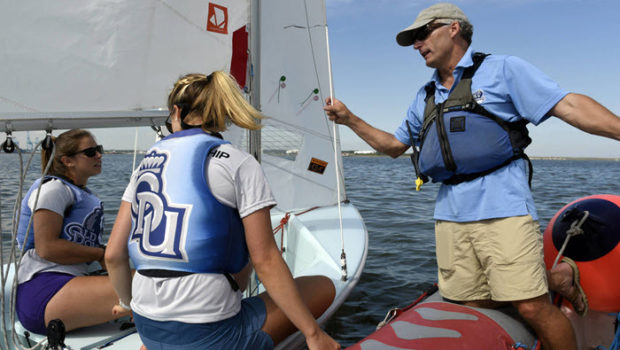Top 10 mental myths in sailing
Published on February 8th, 2023
As a mental performance coach, frequently working with sailors, Tim Herzog has repeatedly heard some misconceptions about performance that are perpetuated among sailors, coaches, and parents alike. Here are some alternative perspectives…
1) “I knew that if I had decided to do XYZ (e.g., train harder), then I definitely would’ve won.” Then why didn’t you? In the late 1700’s world-renowned chess player Deschappeles (no, not the comedian) was afraid he wasn’t as good as people thought he was. His “solution?” Deschappeles would start by taking a pawn off the table. If he won, he could boast by saying how good he was, but if he lost, he had a built-in excuse. It’s hard but it absolutely feels better to try and fail than to self-sabotage, and who knows? In facing your fears, you might even succeed!
2) “If I believe I can succeed, I am guaranteed success.” Think about it like this… if you knew the “magic odds” of success, they wouldn’t be 10/10. For example, let’s say you have a 6 out of 10 chance of winning a race. If you believe with 100% of your soul that you can achieve success, it is easier to fully focus on the task at hand, and you keep the odds at 6/10. But if you think, “maybe I can do this and maybe I can’t…” (50% of your being) you’re likely not fully present, you knock the odds down to 3/10. And if you believe, “I can’t do it” (i.e., 0%), you knock the odds of success down to 0/10, as your get consumed with fantasies associated with failure. Of course, this idea is conceptual (not literal) but you probably get it….
3) “I need to be confident before I perform.” Feeling confident feels nice but it’s not a pre-requisite for success. In fact, we usually perform and then feel confident, rather than vice versa. Think of all the times you maybe had a breakthrough performance while you had no expectations at all. It is okay to have self-doubt; acknowledge it, cope with it, and focus on more important things (like strategy and boatspeed).
4) “If I just do ______, I’m guaranteed success.” There simply are no guarantees, and maybe that’s not such a bad thing. How boring would sport be if we knew the outcome in advance?! Part of what makes sport exciting is that it can’t all be scripted; anyone can win any given race. Anything can happen, and we work hard to have influence over the outcome, but there are never guarantees because there are uncontrollables in the mix (e.g., the weather, competitors’ performance, race committee work, and umpires).
5) “I have to win” (or “should,” or “must”). Really? According to who/what? This kind of language likely creates unneeded pressure. Notice what you’re saying to yourself and whether it gets you amped enough or if it maybe gets you too amped up. Acknowledging, “I’d like to win,” can take that pressure off and make success more likely as you focus on more important things right now (rather than outcomes in the past or future). Check out the inverted U graph below.
6) “Picturing the bad race in my head, over and over, ensures I won’t do it again.” Repeated mental rehearsal of mistakes actually makes you more likely to repeat them, not less. Review your mistakes once or twice, and then do many mental reps of what you want to do next time in a similar scenario… Trust that you’ve learned from it, allow yourself to let go, and focus on the most important thing now.
7) “Doing mental imagery of success will help me succeed.” Not exactly. In fact, there is some research that shows that when we do imagery of things like crossing the finish line in front, we expect it to somehow magically happen. It’s like we give ourselves a pat on the back for a “job well done,” when we haven’t even done the work yet. Instead, picture different kinds of adversity you will likely face, and imagine the steps you will take to move past obstacles. If you experience some negative imagery, don’t catastrophize it. Let it come and go, while making a point of now rehearsing what you want to do (rather than what you don’t want to do).
8) “My skipper (or coach or parent) just needs to push me harder.” Actually, almost nobody said that, ever. It is a common misconception that if someone is floundering, they just need a little fire under them. Skippers are wise to speak succinctly and calmly. Parents serve their kids best by creating opportunities, and by either watching/expressing enjoyment or by staying away. A coach’s job is to facilitate learning of boatspeed, boat-handling, tactics, and strategy. Let sailors determine how to get themselves motivated (and let them experience feelings of autonomy in the process). And note, sometimes a they’ll act withdrawn not because they’re too mellow; rather it can be a cover for being too amped. If you suspect someone is too amped, suggesting a few nice long (6 second) exhales is often the best advice you can give.
9) “I need to set specific goals about what place I’ll finish.” Outcome goals, like place, can be a great motivator, so that you put in the hard work, even on those days when you’re not feeling like training. But during practice, or during racing, thinking about what place you finish is just a distraction. Imagine I suggest we drive to California (from Annapolis, Maryland) and we hop in the car and I say, “going to California, going to California, going to California…” Focusing on the outcome of California while not looking at GPS, a map, drive times, or the gas gage, I could end up in Maine or Florida! Embrace the process, and desirable outcomes become more likely (but never guaranteed) biproducts.
10) “It’s best if I know my scores during sailing.” Why would it be? Scores are mostly just a distraction. Let one person be in charge of knowing the scores. If you have a coach, partner with them so they let you know only during scenarios such as when there’s a specific boat you need to beat going into the final qualifying race, or the last race of the regatta. At that point you can cover certain people and consider match racing them. To drill this scenario so that you get better at tactics (and handling your nerves), you (or your coaches) can invent scenarios (e.g., “Hey Tommy! Susie has 2 points on you, and Beth is 3 points behind you. This is the ‘last’ race.”).
Think I’ve got it wrong on any of this? Awesome! I love challenges. Reach out and let’s explore some ideas together (tim@reachingahead.com). More importantly, let’s collaborate on figuring out what really works for you. I love working with sailors and coaches alike!
Dr. Tim Herzog is a Licensed Clinical Psychologist (Virginia) and Licensed Counselor (Maryland, Pennsylvania, and Montana, and Rhode Island). More information at www.reachingahead.com
Report previously published in SpinSheet magazine.










 We’ll keep your information safe.
We’ll keep your information safe.